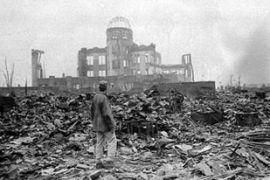Congo official in uranium scandal
Nuclear scientist is accused of dealing uranium as part of a “criminal network”.

Published On 9 Mar 2007
“It was a criminal network,” said Mushi, whose ministry oversees the Regional Centre for Atomic Energy where Lumu works.
Lumu, together with another official, was arrested earlier this week after a newspaper in Kinshasa, the country’s capital, reported that uranium had gone missing from the city’s atomic institute.
Officials at the centre, which houses a small inactive reactor on a university campus, declined to comment, referring all questions to the minister.
Newspaper allegations
Kinshasa’s Le Phare newspaper reported around 100 bars of uranium had gone missing from the centre. But Mushi said he was skeptical about the details of the report and said foreign diplomats had visited the site on Wednesday.
“We’ll verify but you should know that there is no uranium stocked at the centre,” he said. “If there is uranium over there it is for research.”
The Shinkolobwe mine in the Democratic Republic of Congo provided high-quality uranium for the Manhattan Project, the secret US programme that produced the two atomic weapons dropped on the Japanese cities of Hiroshima and Nagasaki in World War Two.
When Congo was granted from independence in 1960, Belgium sealed the mine by filling its shafts with concrete.
Diplomatic and intelligence sources have suggested in the past that countries suspected of seeking nuclear arms might have exploited lax security in the former Belgian colony in order to obtain uranium.
Source: News Agencies